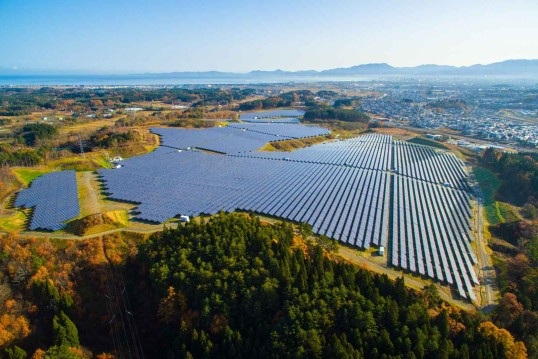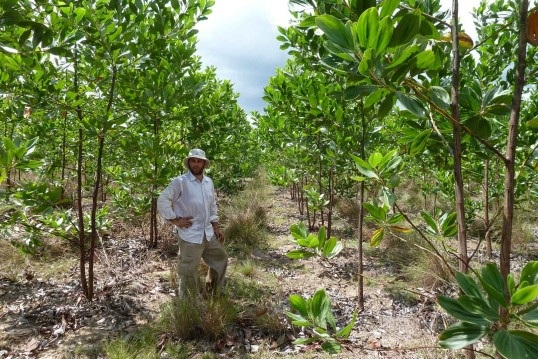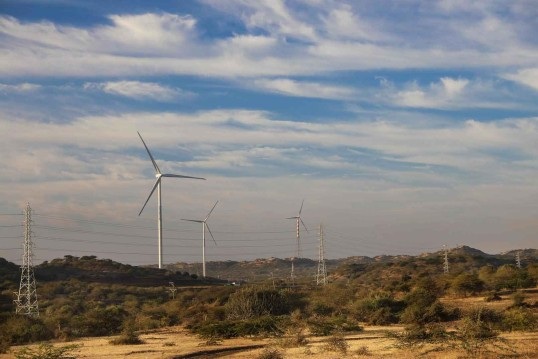We support climate protection projects
General Logistics Systems B.V. (GLS B.V.) cooperates with ClimatePartner GmbH (ClimatePartner) to offset greenhouse gas emissions by investing in climate protection projects.
As part of GLS B.V., we, General Logistics Systems Germany GmbH & Co. OHG (GLS Germany), additionally and voluntarily offset a calculated amount of greenhouse gas emissions generated during parcel transport for our business customers for the fiscal year 2025/26 (01/04/2025 – 31/03/2026), in cooperation with ClimatePartner. Further information about emission offsetting and our investments in climate protection projects is provided below.
Sustainable parcel shipping means that, in addition to reducing greenhouse gas emissions from parcel transport through our environmental strategy GLS Klima Protect—such as converting delivery fleets to alternative drives, using renewable energy, and improving energy efficiency at our sites—we, GLS Germany, additionally and voluntarily offset a calculated amount of greenhouse gas emissions (approx. 140,000 t CO2 equivalents) caused by the transport of parcels for our business customers for the fiscal year 2025/26 (01/04/2025 – 31/03/2026) through certified climate protection projects. These projects aim to avoid and remove greenhouse gases from the atmosphere, and support sustainable forest management and reforestation with our partner ClimatePartner (see project overview below).
The climate protection projects supported by GLS Germany in cooperation with ClimatePartner contribute to the avoidance and removal of greenhouse gas emissions from the atmosphere and support sustainable forest management and reforestation (see project overview below). Their effectiveness results from reforestation (approx. 13,000 hectares) and preserving the carbon storage capacity of forests (approx. 8,000 hectares) in Colombia, as well as the expansion of wind and solar power in India, which reduces reliance on fossil energy and the associated greenhouse gas emissions from electricity generation.
As GLS Germany, we offer our business customers the opportunity to offset greenhouse gas emissions from parcel shipping via the climate protection projects we have selected in cooperation with ClimatePartner, as an individual service on demand. This service includes offsetting the quantity of greenhouse gases calculated by multiplying the number of parcel and freight consignments by the average greenhouse gas emissions (CO2 equivalents per parcel and freight consignment) for the destination country.
As our offsetting partner, ClimatePartner purchases Verified Emission Reductions (VERs) on the voluntary carbon market on behalf of General Logistics Systems B.V. (GLS B.V.)—these confirm that a specific amount of greenhouse gases has been reduced, avoided, or removed through climate protection projects—in the amount calculated and selected for GLS Germany (approx. 140,000 t CO2 equivalents for the fiscal year 2025/26 / 01/04/2025 – 31/03/2026).
Based on these VERs, ClimatePartner issues individual offsetting certificates for the business customers of GLS Germany who choose this service, confirming that the amount of greenhouse gases stated on the certificates has been offset.
The GLS B.V. website provides a detailed overview of the process from purchasing VERs to issuing offset certificates by ClimatePartner.
The climate protection projects supported by GLS Germany to offset greenhouse gas emissions are certified according to international standards such as the Gold Standard (GS), developed by WWF and other environmental organisations (see project overview below).
The GS, as an international certification standard for climate protection projects, is characterised by its consideration of greenhouse gas emissions and its focus on additional sustainability aspects. Projects certified according to the GS also contribute positively to sustainable development and environmental protection.
The climate protection projects GLS Germany invests in with ClimatePartner differ in the type of verified emission reductions (VERs) they are based on.
VERs for emission avoidance (so-called "avoidance carbon credits") come from projects that prevent potential greenhouse gas emissions from entering the atmosphere. For example, renewable energy projects such as wind and solar that replace fossil-fuel-based electricity sources help avoid future greenhouse gas emissions.
VERs for emission removal (so-called "removal carbon credits") originate from projects that remove already emitted greenhouse gases from the atmosphere and store them over a long period. For example, reforestation and afforestation projects remove CO₂ by absorbing it through photosynthesis and storing it in trees.
Our supported climate protection projects
In cooperation with ClimatePartner, GLS Germany is investing in the following third-party climate protection projects for the fiscal year 2025/26 (01/04/2025 – 31/03/2026) to offset greenhouse gas emissions outside our supply chain.
Guttigoli, India
Gold Standard VER (GS VER)
Vichada, Colombia
Gold Standard VER (GS VER)
Gadhsisa, India
Gold Standard VER (GS VER)
You might also be interested in
Klima Protect | Sustainable parcel shipping with GLS
With our GLS Klima Protect strategy, you can focus on the avoidance and reduction of greenhouse gas emissions when shipping parcels and invest with us in climate protection projects.
Our certifications
Completely transparent: we meet international standards and disclose environmental data. With certifications for our environmental and quality management, our voluntary commitment through EcoVadis and our GPD certification, we demonstrate: we are always striving to improve.
Social responsibility
For us, sustainability also means taking social responsibility. Find out how we support people and society here.
Any questions? Visit our FAQ service center.


